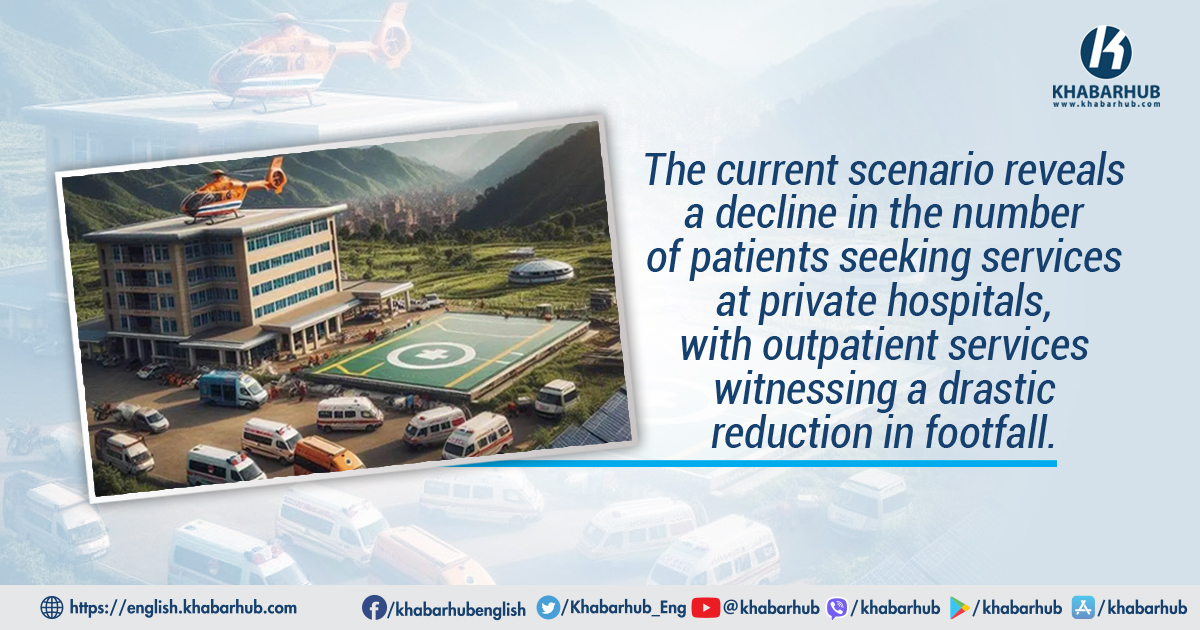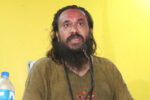KATHMANDU: The reverberations of the global economic downturn are now making their mark on Nepal, affecting various sectors such as financial institutions, cooperatives, industry, trade, and media.
The latest casualty is the private healthcare sector, which is experiencing a significant impact from the ongoing economic recession.
Private hospitals, once thriving and heavily invested in during the COVID-19 pandemic, are now facing closures in different regions, including the Kathmandu Valley.
The current scenario reveals a decline in the number of patients seeking services at private hospitals, with outpatient services witnessing a drastic reduction in footfall.
Doctors report a noticeable drop in patient visits, which used to see crowded waiting areas bustling with hundreds of people every day.
Examining specific cases, Star Hospital in Lalitpur, which boasted an annual revenue of approximately one billion rupees two years ago, now finds itself restricted to 450 million rupees.
Sources from the hospital indicate a sharp decline in income, with figures dropping to 45 million 10 million rupees in 2023.
While government hospitals offer more cost-effective treatments compared to private counterparts, concerns persist regarding patient accessibility and delays in receiving treatment.
This marks a staggering 49.72 percent decrease in the hospital’s income over the past two years.
Similarly, other prominent private hospitals such as Mediciti, Norvic Hospital, Frontline, and Grande are also grappling with financial losses.
The health sector ideally should prioritize service over profit, but the reality is that financial considerations are intricately linked to every industry.
Even smaller hospitals are not immune to the downturn, and Pankaj Khatiwada, Secretary of Association of Private Health Institutions Nepal (AFIN), the umbrella organization of private hospitals, has been vocal about the deteriorating condition of most investors in the sector.
CEO Lok Bahadur Tandon of Green City Hospital in Kathmandu acknowledges the economic downturn’s impact on the hospital’s operations.
Despite starting with an initial investment of 150 million and operating for 11 years with 100 beds, Green City Hospital is now facing financial challenges, with plans to expand its bed capacity seemingly hindered by a lack of optimism regarding income prospects.
This financial crisis in private hospitals is reflective of a larger trend. Recent years have seen a surge in private hospital establishments in Nepal.
According to the ‘Nepal Health Fact Sheet 2023,’ 469 private hospitals were added in the fiscal year 2079-080, bringing the total number of private hospitals to 2,551 across the country.
The Ministry of Health reported 2,082 private hospitals in Nepal in the fiscal year 2077-078 and 2,155 in the fiscal year 2078-079.
The concentration of private hospitals is particularly notable in the Bagmati region, with 1,536 private hospitals.
Additionally, there are 250 private hospitals in Madhesh, 234 in Lumbini, 217 in Koshi, 157 in Gandaki, 75 in Karnali, and 82 in the Sudurpaschim Province.
Criteria such as qualified doctors, advanced equipment, accessible services, and open spaces are considered in evaluating the quality of healthcare institutions.
This surge in private hospital openings raises concerns about the sustainability and viability of such ventures amid the current economic challenges.
Challenges in the Health Sector
The health sector ideally should prioritize service over profit, but the reality is that financial considerations are intricately linked to every industry.
Private hospitals, in particular, are designed with the primary objective of generating profit.
However, the ongoing economic recession has posed challenges for these institutions as they grapple with a decline in income attributed to a decrease in patient check-ups.
Umakanta Acharya, the owner of NIMS National Hospital Damak Jhapa, emphasizes the shift towards a service-oriented approach amid financial struggles.
Acharya advocates for government intervention, suggesting subsidized interest loans to support health institutions during these challenging times.
Impact of Government Hospital Reforms
While government hospitals offer more cost-effective treatments compared to private counterparts, concerns persist regarding patient accessibility and delays in receiving treatment.
However, recent improvements in the standard of government hospitals, coupled with continuous enhancements, have led some to believe that the influence of government initiatives is causing private hospitals to face difficulties.
Criteria such as qualified doctors, advanced equipment, accessible services, and open spaces are considered in evaluating the quality of healthcare institutions.
The current situation necessitates a comprehensive approach to address the multifaceted challenges faced by the health sector, balancing the needs of both private and government healthcare institutions.
Notably, minimum service standards have been implemented in third-class central government hospitals providing specialist services, fostering a culture of ongoing competitive improvement.
The government is also working on enhancing state and local government health institutions, with a focus on addressing the needs of seriously ill and pregnant women in remote areas.
Manpower Concerns
The health sector is grappling with a rising trend of young professionals leaving the country, impacting private hospitals.
Khatiwada, Secretary of AFIN, notes the challenges faced by private hospitals in recruiting skilled manpower, particularly as medical graduates seek opportunities abroad due to perceived limitations in their home country.
Khatiwada highlights insurance difficulties faced by many hospitals, citing issues related to timely renewal and government approval for adding new services.
He also raises concerns about delays in obtaining permission for nursing classes, hindering the development of skilled healthcare professionals.
Protests by patients’ relatives and attacks on doctors further exacerbate challenges for private health institutions.
Khatiwada emphasizes that the tendency to blame hospitals for patient outcomes, even in unavoidable circumstances, adds to the discomfort experienced by private hospitals.
Tandon, CEO of Green City Hospital, expresses worry over the increasing exodus of young doctors, predicting potential significant losses for the government if the trend persists.
The current situation necessitates a comprehensive approach to address the multifaceted challenges faced by the health sector, balancing the needs of both private and government healthcare institutions.









Comment